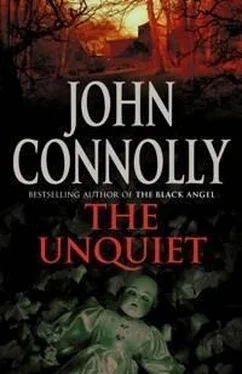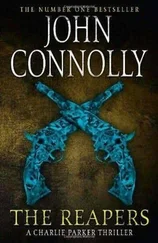“Did you ever meet a man called Jim Poole, Mr. Dubus?”
He pantomimed deep thought.
“You know, I think I did. He was a fool, just like you.”
“He disappeared.”
“He got lost. Gilead took him.”
“Is that what you think?”
“I know it. Doesn’t matter where he is, or if he’s alive or dead, he’s a prisoner of Gilead. You set foot in Gilead, and you’re lost.” His gaze turned inward. His eyes stopped blinking. “They said that we brought evil to that place, but it was there already,” he said, and there was a touch of wonder to his voice. “I felt it as soon as I set foot there. Old Lumley picked a bad spot for his city of refuge. The ground was poisoned, and we were poisoned too. When we left, the forest, or something under it, took it back.”
He gave a small, sick laugh. “Too much time to myself,” he said. “Too much time to dwell on things.”
“What was the Project, Mr. Dubus?”
He laugh faded away. “The Project. The Hobby. The Game. They all mean the same thing.”
“The abuse of children.”
He shook his head. “You may call it that, but that’s because you don’t understand. It’s a beautiful thing. That’s what I try to explain to those who come here, but they don’t listen. They don’t want to know.”
“Did Daniel Clay listen?”
“He was different. He understood.”
“Understood how?”
But Dubus did not reply.
“Do you know where Daniel Clay is?” I asked.
Dubus leaned forward. “Who knows where dead men go?” he said. “You head north, and maybe you’ll find out. It’s time for my show.”
He hit the remote again, adjusting the volume as he did so, and the TV blared into life. He turned in his chair, no longer facing toward me. I let myself out.
And as we drove away, I saw the drapes move at Dubus’s window. A hand was raised in farewell, and I felt sure that, in his clean, neat house, the old man was laughing at me.
In the days that followed, the police would attempt to piece together the chain of events, to connect body to body, contacts to killings. During the final hours of his life, Dubus made two telephone calls, both to the same number. After his death, the cell phone would be found beside his body. He had hidden it under a loose plank beneath his bed, and to discourage any of those entrusted with monitoring him from discovering it, he kept a half-filled chamber pot above it, its stink enough to ensure that no fastidious parole officer would dare to venture there, although it might have struck a careful searcher that, in his otherwise pristine house, it was the only place where Dubus’s orderliness appeared to have lapsed. The phone was prepaid, and had been bought for cash at a bigbox store one month previously. It was not, the police guessed, the first time that Dubus had circumvented the restrictions on his telephone use in this way.
Dubus made the second-to-last call of his life minutes after Louis and I had departed, then presumably returned the phone to its hiding place and went back to watching his TV shows. Tick-tick-tick went the seconds, counting down to the moment when Mason Dubus would at last depart this earth and face the greater justice that waits for every man.
But that was all to come. For now, the daylight was gone. There was no moon. We drove on, speaking rarely. The music was low, the National on the car stereo singing of doves in the brain and hawks in the heart, and I thought of men with the heads of birds.
And in time we came to Jackman, and old Gilead got into our souls.
Revenge proves its own excutioner
– JOHN FORD, THE BROKEN HEART
It is often said that there are two Maines. There is the Maine of the summer tourists, the Maine of lobster rolls and ice cream, of yachts and boat clubs, a Maine that occupies a neat strip of coastline about as far north as Bar Harbor, with high hopes and property prices to match, apart from those towns without the good looks or good fortune to attract the tourist dollar, or those that have seen their industries fade and die, marooning them in a lake of prosperity. The rest of Maine derisively refers to the inhabitants of this region as “flatlanders” or, in even darker moments, dismisses them entirely as residents of “ Northern Massachusetts.”
The other Maine is very different. It is a Maine primarily of forests, not ocean, dominated by “the County,” or Aroostook, which has always seemed a separate entity due to its sheer size, if nothing else. It is northern and inland, rural and conservative, and its heart is the Great North Woods.
But those woods had begun to change. The big paper companies, once the backbone of the economy, were slowly relinquishing their hold on the land, recognizing that there was more money in property than raising and cutting trees. Plum Creek, the nation’s largest paper company, which owned nearly five hundred thousand acres around Moosehead Lake, had earmarked thousands of those acres for a massive commercial development of RV parks, houses, rental cabins, and an industrial park. For those in the south, it represented the despoiling of the state’s greatest area of natural beauty; but for those in the other Maine, it meant jobs and money and an influx of new blood into dying communities.
The reality was that the forest canopy hid the fastest-growing poverty rate in the nation. Towns were shrinking, schools were getting smaller, and the bright young hopes of the future were leaving for York and Cumberland, for Boston and New York. When the mills shut down, high-paying jobs were replaced by minimum-wage labor. Tax revenues fell. Crime, domestic violence, and substance abuse increased. Long Pond, once bigger than Jackman, had virtually died with the closure of its mill. Up in Washington County, almost within sight of the summer playground of Bar Harbor, one in five people lived in poverty. In Somerset, where Jackman lay, it was one in six, and a steady stream of people made their way to Youth and Family Services in Skowhegan, seeking food and clothing. In some areas, there was a waiting list of years for a Section 8 voucher, at a time when rural rental assistance and funding for Section 8 was steadily falling.
Yet Jackman, oddly, had prospered in recent years, in part because of the events of 9/11. Its population had fallen rapidly during the 1990s, and half of its housing units had been vacant. The town still had its lumber mill, but the changing nature of tourism meant that those who now headed north came in camper vans, or rented cabins and cooked for themselves, leaving little money in the town. Then the planes hit, and suddenly Jackman found itself on the front line of the fight to secure the nation’s borders. U.S. Customs and Border Protection doubled its manpower, house prices shot up, and, all things considered, Jackman was now in a better position than it had been for a long time. But even by Maine standards, Jackman remained remote. The nearest courthouse was in Skowhegan, sixty miles to the south, and the cops had to come up to Jackman from Bingham, almost forty miles away. It was, in its strange way, a lawless place.
Just as we came out of Solon, the Kennebec appeared before us. There was a sign by the side of the road. It read: “Welcome to Moose River Valley. If you don’t stop, smile on the way through.”
I looked at Louis.
“You’re not smiling,” I said.
“That’s ’cause we’re stopping.”
I guessed that statement could be taken a number of ways.
We didn’t head into Jackman that night. Instead, we pulled off the road a little way outside town. There was an inn on a small hill, with motelstyle rooms, a tiny bar beside the reception area, and a restaurant with long benches designed to feed the hunters who gave it a reason to exist in winter. Angel had already checked in, although he was nowhere to be seen. I went to my room, which was simply furnished and had a small kitchen area in one corner. There was underfloor heating. It was stiflingly hot. I turned off the heating, ignoring the warning that it would take twelve hours for the system to warm the room to its maximum again, then went back to the main building.
Читать дальше












